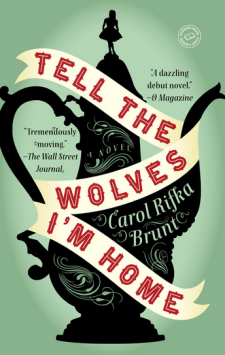 |
| The Dial Press (Random House) |
Carol Rifka Brunt
2012
The Summary
"1987. The only person who has ever truly understood fourteen-year-old June Elbus is her uncle, the renowned painter Finn Weiss. Shy at school and distant from her older sister, June can be herself only in Finn's company; he is her godfather, confidant, and best friend. So when he dies, far too young, of a mysterious illness her mother can barely speak about, June's world is turned upside down. But Finn's death brings a surprise acquaintance into June's life.
"At the funeral, June notices a strange man lingering just beyond the crowd. A few days later, she receives a package in the mail containing a beautiful teapot she recognizes from Finn's apartment, and a note from Toby, the strange, asking for an opportunity to meet. As the two begin to spend time together, June realizes she's not the only one who misses Finn, and that this unexpected friend just might be the one she needs the most."
The Good
Simultaneously heart-wrenching and heart-warming, Tell the Wolves I'm Home is one girl's story as she puzzles through her adolescent years and a loss that has rocked her world. June's story is bittersweet, mingling loss and love, prejudice and acceptance, revealing a candid story about her feelings for her uncle and his boyfriend, about her future and her relationship with her sister.
At it's core, it feels like a coming-of-age story; however, Tell the Wolves I'm Home is much more. Yes, it's about June Elbus and it's about her struggles to acclimate to high school, to impending adulthood, but I found it contained so much more when it broached the subject of her Uncle Finn's disease and her acceptance of Toby.
As Brunt points out in an interview with Elin Hilderbrand, she didn't think of her novel as coming-of-age story until much later. Furthermore, she says:
"I saw it more as an unlikely friendship story between June and Toby. Since June is fourteen, and the events of the novel are life-changing, the novel automatically becomes a coming-of-age story. [...] If the same events happened to a slightly older narrator, the book would just be called fiction. I actually had to go back and make the coming-of-age elements more apparent because it really wasn't a big part of my way of thinking about his novel."Tell the Wolves I'm Home has much to offer in the examination of human relationships - for example, June and Greta's relationship, June and Finn's relationship, June and Toby's relationship, or even Danni (June's mother) and Finn's relationship - and human emotion when reflected with both personal loss and social issues.
The Bad
Admittedly, I struggled to read much of this novel. Don't get me wrong, Brunt is a very talented writer and June is a candid, thoughtful narrator, so I have no complaints about the writing style of and character quirks in Tell the Wolves I'm Home.
However, June's story is sometimes confusing and awkward and embarrassing and despairing - and, occasionally, it's difficult to feel so many of those volatile, teenage emotions that make you feel so inadequate, so uncertain. You feel what June feels, you see the world as she sees the world, good and bad, black and white and gray, and it's a heady mixture to take in when she lays bare every real, raw emotion.
The Ugly
Prejudice. HIV/AIDS. Loss. Love.
Pick one.
No comments:
Post a Comment